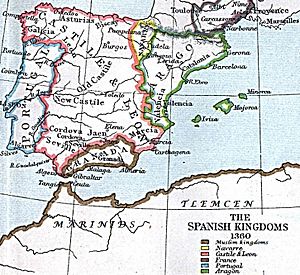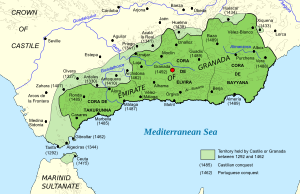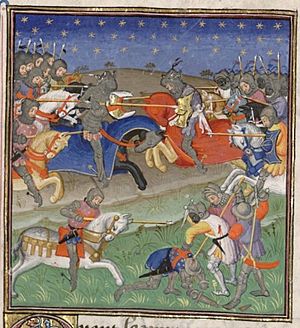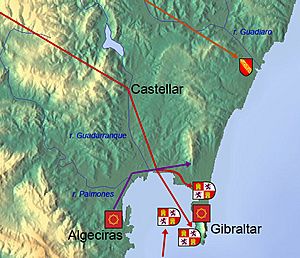Muhammad IV of Granada facts for kids
Quick facts for kids Muhammad IV |
|
|---|---|
| Sultan of Granada | |
| Reign | 8 July 1325 – 25 August 1333 |
| Predecessor | Ismail I |
| Successor | Yusuf I |
| Born | 14 April 1315 Granada |
| Died | 25 August 1333 (aged 18) |
| Dynasty | Nasrid |
| Father | Ismail I |
| Religion | Islam |
Muhammad IV (full name: Abu Abdullah Muhammad ibn Ismail) was a young ruler of the Emirate of Granada in Spain. He was the sixth sultan of the Nasrid dynasty. He became sultan when he was only ten years old, after his father, Ismail I, was sadly killed in 1325.
His early years as sultan were tough. His ministers fought for control of the government. This led to a civil war in Granada. Muhammad IV asked for help from the Marinid Sultanate in Morocco. He gave them some lands in Spain in exchange for their soldiers.
The civil war ended in 1328. Muhammad, even though he was young, started to take charge. He made peace with a powerful commander named Uthman ibn Abi al-Ula. In 1329, he appointed his childhood teacher, Abu Nuaym Ridwan, as his chief minister, called a hajib. This was a very important job.
In 1328 and 1329, the Christian kings Alfonso XI of Castile and Alfonso IV of Aragon formed an alliance against Granada. They invaded Granada in 1330. Muhammad IV made a peace treaty with Castile in 1331. However, the treaty was soon broken.
Muhammad IV sailed to Morocco in 1332 to ask for more help. The new Marinid Sultan, Abu al-Hasan Ali, sent 5,000 troops. These troops helped Granada capture Gibraltar from Castile in 1333. Later, Muhammad IV was sadly killed at the age of 18. His brother, Yusuf I, became the next sultan.
Contents
About Granada and Its Neighbors

The Emirate of Granada was the last Muslim kingdom in Spain. It was founded in the 1230s. Granada managed to stay independent for a long time. This was impressive because it was located between two strong neighbors. To the north was the Christian kingdom of Crown of Castile. Across the sea in Morocco was the Muslim Marinid Sultanate.
Granada often made alliances or went to war with these powers. Sometimes, they even encouraged them to fight each other. This helped Granada avoid being taken over by either side. The sultans of Granada sometimes paid money, called tribute, to the kings of Castile. This was a big cost for Granada.
Between the late 1200s and mid-1300s, there was a long struggle. This was called the "Battle of the Strait". Granada, Castile, and the Marinids fought for control of important ports. These ports were near the Straits of Gibraltar. Controlling these ports meant controlling trade and travel between Spain and North Africa.
When Muhammad IV became sultan, Castile held Gibraltar. This allowed them to bother ships going to Algeciras, which Granada controlled. Granada's control of Algeciras also made it hard for ships to reach Gibraltar.
Muhammad IV's Early Life
Muhammad IV was born in the city of Granada on April 14, 1315. He was the first son of Sultan Ismail I. His father became sultan in 1314.
On July 8, 1325, his father was killed by a relative. Muhammad was only ten years old at the time. He was immediately declared the new sultan on the same day. His father's chief minister, Abu al-Hasan ibn Mas'ud, was hurt trying to protect Ismail I. But he still helped the court declare their loyalty to young Muhammad IV.
Many important people supported Muhammad IV. These included judges, religious scholars, and government officials. His grandmother, Fatima bint al-Ahmar, was also very important. She gave him extra support because she was from the royal family.
His Time as Sultan
Young Sultan and His Advisors
Because Muhammad IV was so young, his government was influenced by his advisors and his grandmother. At first, Ibn Mas'ud continued as the chief minister, called a vizier. But he died a month later from his wounds.
He was replaced by Muhammad ibn al-Mahruq. This new vizier was chosen by Uthman. Uthman was a powerful military leader. He commanded the "Volunteers of the Faith". These were North African soldiers who fought for Granada. Uthman's power and his link to the vizier made him very influential. Muhammad's childhood teacher, Abu Nuaym Ridwan, and his grandmother also helped guide the government.
Soon, Uthman started to act like a dictator. He took away power from other ministers. He also used most of the state money to pay his soldiers. This made Ibn al-Mahruq worry that Uthman was planning to take over.
Civil War in Granada
A big rivalry started between Uthman and Ibn al-Mahruq. In December 1326, Uthman's troops took over the city. They forced Ibn al-Mahruq and his supporters to stay inside the Alhambra palace. This made Uthman's own soldiers leave him.
Uthman and his followers went to Almería. There, he declared Muhammad IV's uncle, Muhammad ibn Faraj, as a rival sultan. This happened in January 1327. This started a full civil war in Granada.
Uthman asked the Castilians for help. King Alfonso XI of Castile quickly took advantage of the fighting in Granada. He invaded Granada's western areas. Some sources even say that one of Uthman's sons helped Alfonso XI. Alfonso captured several castles in June 1327.
At sea, Granada's navy was defeated by Castile. Muhammad's court had to ask the Marinid Sultanate for help. He gave them the cities of Ronda, Marbella, and Algeciras. In return, the Marinid sultan sent troops to help Muhammad in 1327 and 1328.
Muhammad, now 13, began to take more control. The civil war had caused a lot of damage. In 1328, he made peace with Uthman ibn al-Ula. On November 6, 1328, Muhammad ordered his servants to kill Ibn al-Mahruq. Muhammad then put Uthman back in charge of the Volunteers. Uthman sent the rival sultan, Abu Abdullah, to North Africa. This finally ended the civil war.
New Leaders and Alliances
On May 17, 1329, Muhammad appointed his former teacher, Abu Nuaym Ridwan, as his hajib. This was a new and very important job in Granada's history. The hajib was like a prime minister. He was above the vizier and other ministers. He also commanded the army when the sultan was not there. Ridwan would keep this powerful job for a long time.
King Alfonso XI of Castile had become an adult ruler in 1325. He had been involved in Granada's civil war, helping Uthman. The king of Aragon, James II of Aragon, had been peaceful with Granada. But he died in 1327. His son, Alfonso IV, became the new king.
Alfonso IV was more aggressive towards Granada. He worried about Muhammad's alliance with the Marinids. The Marinids were increasing their naval activities. Alfonso IV renewed his father's peace treaty with Muhammad. But at the same time, he made an alliance with Alfonso XI of Castile. They signed treaties in 1328 and 1329. Their goal was to attack Granada together. Alfonso IV also married Alfonso XI's sister. He then canceled his treaty with Granada and declared war in March 1329.
Fighting Christian Armies
In February 1330, the Pope declared the war against Granada a crusade. Alfonso IV of Aragon sent knights to invade Granada's border areas. Alfonso XI of Castile led his own troops in July 1330. Castilian forces attacked the fortress of Teba. Granada's army, led by Uthman ibn Abi al-Ula, fought back. But the Granadan forces were defeated, and Teba surrendered on August 30.
Uthman died that same year. His son, Abu Thabit Amir, took over as commander of the Volunteers. The Christian crusader forces attacked the Granadan countryside. This caused severe food shortages. Muhammad had to ask for peace. A peace treaty was agreed on February 19, 1331. It was supposed to last for four years. Muhammad agreed to pay tribute to Castile. Castile also agreed to send food to Granada to help with the shortages. However, Alfonso IV of Aragon refused to join the treaty.
Alfonso XI soon broke the truce. He stopped sending food to Granada. Granada was still at war with Aragon. Muhammad sent an army led by Ridwan to attack the region around Alicante. The Granadan army attacked Guardamar in October 1331. They took captives and also brought back 400 Aragonese Muslims who wanted to join their army.
Muhammad, worried about the ongoing threat, asked the Marinid Sultan for help again. He sailed to Morocco in September 1332 to meet Sultan Abu al-Hasan Ali. The Marinid sultan agreed to send troops.
Marinid Help and Gibraltar
- Further information: Third Siege of Gibraltar and Fourth Siege of Gibraltar
Abu al-Hasan sent 5,000 soldiers, led by his son, Abu Malik Abd al-Wahid. They arrived in Algeciras in early 1333. They soon attacked Gibraltar by sea and land. Granada's troops, led by Ridwan, joined them. The Castilian admiral tried to send supplies to Gibraltar, but the Marinid fleet stopped him.
Meanwhile, Muhammad attacked Castro del Río and captured the fortress of Cabra. Gibraltar's defenders surrendered on June 17, 1333. This was after about five months of fighting. Alfonso XI heard the news when his army was only a few days away.
Alfonso XI quickly marched to Gibraltar to try and take it back. The Muslims had brought more supplies to Gibraltar. Abu Malik's troops fought against Alfonso's army. To distract Castile, Muhammad led a counterattack into Castilian lands. He captured Benamejí and raided areas near Córdoba. He faced no resistance because Alfonso's army was busy.
Muhammad then marched towards Gibraltar. The Muslim and Christian armies faced each other for several days. But neither side was sure they could win. Alfonso was also worried about his own nobles rebelling. So, a truce was agreed on August 24, 1333. Muhammad and Alfonso agreed to the 1331 treaty again. Muhammad visited Alfonso's tent and brought gifts. Alfonso welcomed him respectfully, and they shared a meal.
His Death
Muhammad IV was killed on August 25, 1333, near the Guadiaro river. The sons of Uthman ibn Abi al-Ula were responsible for the plot. One of their slaves carried out the killing.
Some historians say Muhammad was killed because of his alliance with the Marinids. The Marinid involvement meant the "Volunteers of the Faith" soldiers lost their power in Granada. Other sources say he was killed because he was too friendly with Alfonso XI of Castile.
His chief minister, Ridwan, quickly rode to the capital. After talking with Muhammad's grandmother, Fatima, they declared Muhammad's younger brother, Yusuf, as the new sultan. Muhammad's body was found and buried in Málaga. He was buried immediately, as is the custom for a martyr in Islam. Later, a domed tomb was built over his grave.
His Personality
Muhammad IV loved hunting, which was a common hobby for rulers of Granada. He was also a skilled horse rider and often competed with others. He was good at martial arts. He was also interested in books and poetry. He even asked a poet to write verses about the Sierra Nevada mountains. He enjoyed listening to poems to relax.
In early 1332, he became very ill. There were rumors that he had died, but he recovered. When he died at about 18 years old, he did not have any children. He was likely not married.
See also
 In Spanish: Muhammed IV de Granada para niños
In Spanish: Muhammed IV de Granada para niños
 | Emma Amos |
 | Edward Mitchell Bannister |
 | Larry D. Alexander |
 | Ernie Barnes |




